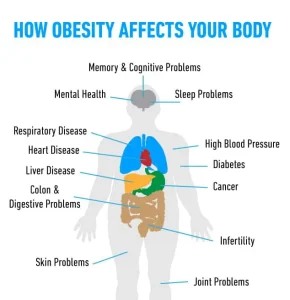Overview
Diagnosis
To diagnose obesity, your health care professional may perform a physical exam and recommend several tests. These help identify possible causes, related health conditions, and the best treatment plan for you.
Common evaluations include:
-
Taking your health history to review weight changes, diet, exercise, and family health background.
-
Conducting a general physical exam, which includes checking your height, weight, heart rate, blood pressure, and listening to your heart and lungs.
-
Calculating your body mass index (BMI). A BMI of 30 or higher indicates obesity, and higher numbers increase health risks further.
-
Measuring your waist circumference. Excess fat around the waist raises the risk of heart disease and diabetes. For women, a waist size over 35 inches (89 cm) and for men, over 40 inches (102 cm), is considered a higher risk.
-
Checking for related health problems, such as high blood pressure, high cholesterol, thyroid disorders, liver disease, or diabetes.
This information helps determine your overall health risks and guides your personalized obesity treatment plan.
Treatment
The main goal of obesity treatment is to achieve and maintain a healthy weight, improving overall health and reducing the risk of obesity-related complications. A team approach involving a dietitian, counselor, or obesity specialist is often the most effective.
Initial goals usually include losing about 5% to 10% of your total body weight. Even modest weight loss can improve health significantly. Treatment methods may include lifestyle changes, medications, and sometimes procedures or surgery.
Dietary changes
Healthy eating is the foundation of obesity treatment. The aim is to create sustainable eating habits rather than short-term diets.
Key strategies include:
-
Cutting calories by identifying and reducing high-calorie foods and drinks.
-
Choosing filling foods with fewer calories, such as fruits, vegetables, and whole grains.
-
Making healthier food choices, emphasizing plant-based foods, lean proteins, and healthy fats.
-
Restricting high-carbohydrate or high-fat foods if advised, and limiting sugary drinks.
-
Trying meal replacement plans for short-term weight loss, if recommended.
-
Avoiding fad or crash diets, which may offer temporary results but rarely succeed long-term.
Exercise and activity
Regular physical activity plays a critical role in managing obesity.
-
Aim for at least 150 minutes of moderate-intensity exercise per week.
-
Gradually increase your activity level to improve stamina and strength.
-
Stay active throughout the day by walking more, taking stairs, or parking farther away.
-
Using a pedometer or fitness tracker can help maintain motivation and monitor progress.
Behavior changes
Lifestyle modification programs can help identify and change unhealthy eating and activity patterns.
-
Counseling with a therapist or psychologist can address emotional eating, stress, or triggers related to overeating.
-
Support groups provide motivation, accountability, and shared experiences with others working toward similar goals.
Weight-loss medicines
Medications may be recommended when diet and exercise alone aren’t enough. They should always be used along with lifestyle changes.
Common options include:
-
Bupropion-naltrexone
-
Liraglutide
-
Orlistat
-
Phentermine-topiramate
-
Semaglutide
These medicines work differently to help reduce appetite, improve metabolism, or limit fat absorption. Weight regain can occur if medication use is discontinued without maintaining lifestyle habits.
Endoscopic procedures for weight loss
Endoscopic weight-loss procedures are minimally invasive and performed without surgical cuts.
Examples include:
-
Endoscopic sleeve gastroplasty, which uses stitches to reduce stomach size and food capacity.
-
Intragastric balloon placement, which temporarily reduces stomach volume to promote fullness with less food.
Weight-loss surgery
Bariatric surgery may be an option for severe obesity or when other treatments fail.
Common types include:
-
Adjustable gastric banding, which divides the stomach into small sections using a flexible band.
-
Gastric bypass surgery, which creates a small stomach pouch that connects directly to the small intestine, bypassing most of the stomach.
-
Gastric sleeve surgery, where part of the stomach is removed to create a smaller food reservoir.
Surgery requires a lifelong commitment to healthy eating and physical activity for lasting results.
Other treatments
Additional treatment options include:
-
Hydrogels, taken as capsules to expand in the stomach and promote fullness.
-
Vagal nerve blockade, which uses electrical pulses to regulate hunger signals.
-
Gastric aspiration therapy, allowing partial removal of stomach contents after meals to reduce calorie absorption.
Successful obesity management depends on long-term commitment to lifestyle changes, regular monitoring, and support from your health care team.
Advertisement

